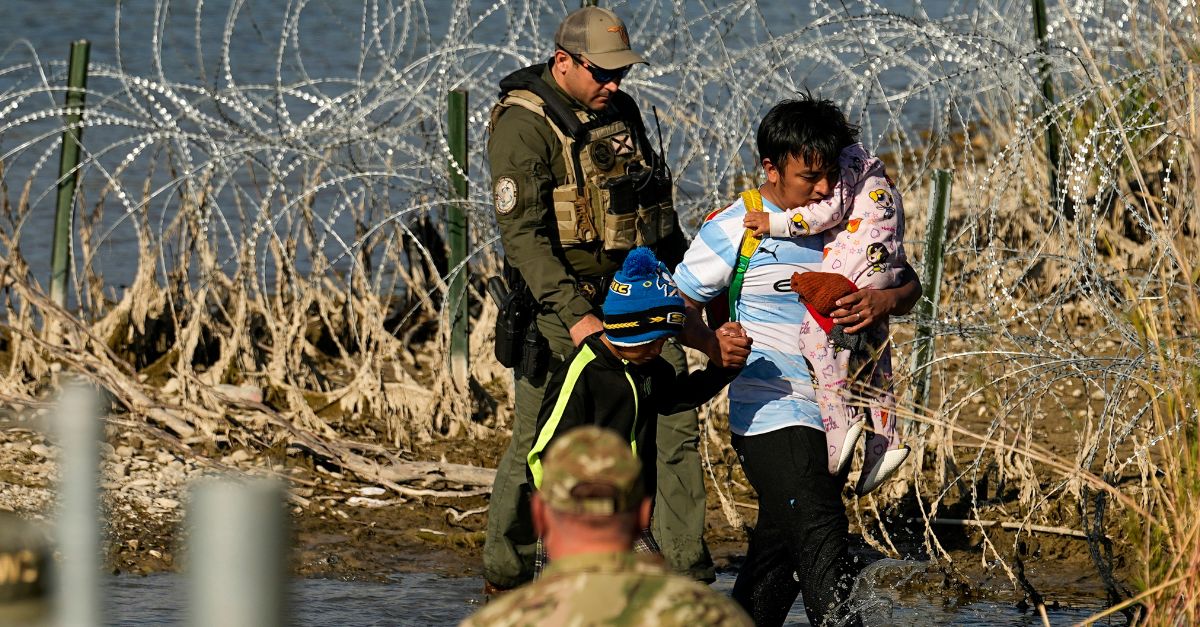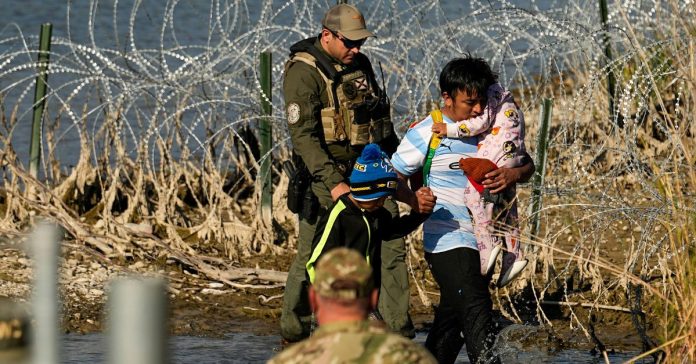
Migrants are taken into custody by officials at the Texas-Mexico border, Jan. 3, 2024, in Eagle Pass, Texas. (AP Photo/Eric Gay, file)
The nation’s most conservative appeals court is locked in a duel with the U.S. Supreme Court after it issued a ruling blocking the same Texas immigration law that the justices lifted a stay on only one day earlier.
On Tuesday, a majority of justices on the nation’s highest court ruled that Texas S.B. 4 could go into effect while the legal battle challenging its constitutionality proceeded through the courts. The law authorizes Texas law enforcement to arrest anyone suspected of illegal border crossing and charge them with crimes ranging from misdemeanors to felonies, then to prosecute and punish them with jail time or return them to Mexico. At the heart of the legal controversy is Texas’ endeavors to regulate immigration at the border — a topic generally reserved exclusively for federal, not state, lawmaking.
The Supreme Court’s ruling Tuesday ended an administrative stay that was put into place by the U.S. Court of Appeals for the Fifth Circuit. Justices Sonia Sotomayor, Ketanji Brown Jackson, and Elena Kagan dissented from the Court’s ruling, with Sotomayor warning the majority that it invited “chaos and crisis” by upholding the Fifth Circuit’s “unreasoned” ruling that allowed Texas to intrude on federal authority.
A three-judge panel of the Fifth Circuit heard oral arguments following the Supreme Court’s ruling on Wednesday, then voted 2-to-1 to block the law.
The panel’s majority was comprised of U.S. Circuit Judge Priscilla Richman and Judge Irma Carrillo Ramirez, while Circuit Judge Andrew Oldham voted for it to remain in effect. Oldham and Richman are both George W. Bush appointees, while Ramirez is a Joe Biden appointee.
Richman said during arguments that no state had previously claimed the authority to deport migrants and asked how Texas would carry out its proposed deportations under S.B. 4.
Texas’s solicitor general argued to the panel that the statute is consistent with federal law and that Texas is simply trying to “make sure” that the “important provisions” of Congressional laws are followed.
By contrast, the Biden administration argued that Texas was attempting to go even further than Arizona did in 2010 with a similar law — one that was struck down by the Supreme Court as being overly intrusive on federal legislative territory.
Throughout the battle over S.B. 4 and at oral arguments Wednesday, Texas advanced the argument that the federal government has provided insufficient border protections and that Texas must protect itself from “invasion” by those crossing the border without authorization. The federal government’s lawyer flatly denied the accusations Wednesday and said numerous statistics had already been introduced into evidence about the administration’s active engagement in the area.
Police from the border city of Eagle Pass have already reported the kind of turmoil opponents of S.B. 4 have warned about, including receiving an increasing number of calls from those reporting people suspected of being in the country without legal authorization.
Eagle Pass police spokesperson Humberto Garza told the Wall Street Journal that the conflicting rulings between the Supreme Court and the Fifth Circuit are causing confusion among law authorities.
“They’re playing volleyball with it over there,” Garza said about the authority to enforce S.B. 4. “We’re standing over here waiting for what it is we’re going to do.”
Texas is not the first state to attempt to regulate immigration at the U.S.-Mexico border. In 2012, the U.S. Supreme Court struck down an Arizona law similar to Texas S.B. 4 and Justice Anthony Kennedy wrote that while there may be “understandable frustrations with the problems caused by illegal immigration,” Arizona was not authorized to create its own immigration laws.
The Court, however, was split 5-3 on the ruling. Kennedy’s majority decision was joined by Chief Justice John Roberts and Justices Ruth Bader Ginsburg, Stephen Breyer, and Sonia Sotomayor. Justices Antonin Scalia, Clarence Thomas, and Samuel Alito dissented. Justice Elena Kagan recused from the case because of her prior involvement in the litigation. The current Supreme Court has notably changed with two remaining dissenters now joined by Justices Neil Gorsuch, Brett Kavanaugh, and Amy Coney Barrett.
Have a tip we should know? [email protected]

